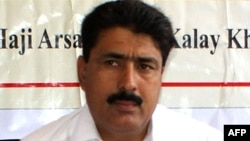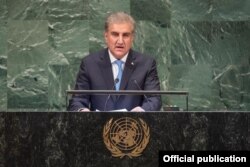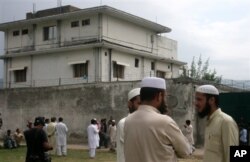Pakistan's foreign minister, Shah Mahmood Qureshi, has hinted ahead of a visit to Washington this week at a possible compromise in the case of a doctor jailed after helping the United States find and kill Osama bin Laden.
Pakistani officials have rebuffed all efforts by the United States to secure the release of the Shakeel Afridi, who was sentenced to a long prison term after he helped U.S. commandos identify the compound in Abbottabad where bin Laden was slain in 2011.
The raid was conducted on Pakistani soil without the government's knowledge, causing deep embarrassment to national authorities, and Afridi's imprisonment has since remained a major irritant in U.S.-Pakistani relations.
But in an interview Sunday with the Fox News cable network, Qureshi indicated that the newly-elected government of Prime Minister Imran Khan may be more flexible on the issue.
"Openings are always there," Qureshi said. Afridi "is seen in Pakistan in a different context. He is considered as a traitor in Pakistan, whereas the United States saw him as a friend. Thus, we would need to work out the differences on this issue."
Despite the apparent opening, Qureshi, who is scheduled to meet U.S. Secretary of State Mike Pompeo in Washington on Tuesday, maintained that the case has been handled appropriately within the Pakistani legal system.
"We have a legal system, and Afridi went through that process," he said. "He was provided with an opportunity to plead his case. He was found guilty and was awarded punishment, and he is going through this sentence now."
Afridi led a fake hepatitis B vaccination campaign to collect genetic samples in order to gain access to the compound where bin Laden was sheltering and confirm his presence and that of his family. Days after the raid, Afridi was arrested and tried on charges of treating and financing terrorists in his native tribal district on the Afghan border.
U.S. officials praised Afridi as a hero for helping Washington bring justice to the mastermind of the Sept. 11, 2001, terrorist attacks in New York and Washington. The Americans argue that the charges against Afridi were manufactured to punish him for his role in the raid, in which bin Laden was killed by a U.S. Navy Seal team.
Analysts tell VOA's Urdu service that progress on the Afridi case could help improve Pakistan-U.S. relations. Najam Rafique, director of the American Studies department in the Islamabad-based Institute of Strategic Studies, said Monday that the case has long created tensions between the two countries, whose efforts to fight terrorism have been complicated by mutual distrust.
"The statement given by Pakistan's foreign minister in the United States could be seen in the context of Pakistan wanting improved bilateral relations with the United States," he said. "Pakistan would, thus, try its best to provide relief to the United States on certain matters so that bilateral relations could move ahead positively."
Rafique added that the timing of the remark ahead of this week's meeting with Pompeo suggested that the new government in Islamabad is ready to talk to the United States on all issues. Qureshi was already in the U.S. for the annual meeting of the U.N. General Assembly in New York.
Afridi was initially sentenced to 33 years in prison, but an appeals court reduced that to 23 years after a hearing. The doctor was transferred from the northwestern city of Peshawar to a prison in the garrison city of Rawalpindi near Islamabad shortly before the May 2 anniversary of the bin Laden raid.
Ayaz Gul contributed to this article, which originated in VOA's Urdu service.






